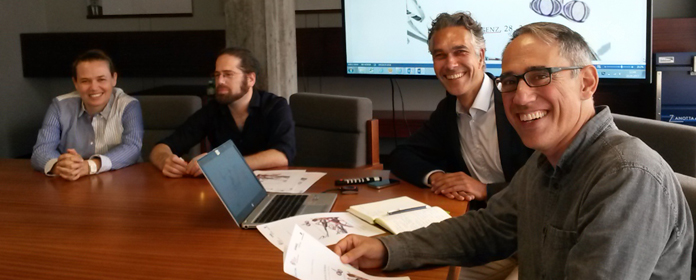An international congress analyzes the representation of finance and Economics after the 2007-2008 crisis and its effects.
The ICS of the University has collaborated in 'Screening Economies', organized in Switzerland by the University of St. Gallen, the Haniel Stiftung Foundation and the high school Kunsthaus Bregenz.

PHOTO: Courtesy
The Institute for Culture and Society (ICS) of the University of Navarra has collaborated in the international congress 'Screening Economies', organized in Switzerland from September 28 to 30 by the University of St. Gallen, together with the Haniel Stiftung Foundation and the Kunsthaus Bregenz Institute.
The congress has analyzed the representation of finance and Economics after the 2007-2008 subprime mortgage crisis and its immediate effects, through graphic novels, photographs, bank promotional material, paintings and even Youtube videos.
From agreement with the organizers, after the collapse of Lehman Brothers, followed by other institutions, neither the general public nor the specialists at Economics adequately understood the events and, as a result, media representations became a discussion about the future of capitalism.
As they have commented, the meeting has tried to approach this topic from a social, political, economic and ideological perspective as a way of understanding and analyzing the current economic and social crises.
A total of fourteen speakers from centers in seven countries took part: Canada, USA, UK, Switzerland, Spain, Germany and Austria. Among them was Constantin Parvulescu, researcher of the ICS's project 'Emotional culture and identity' of the ICS, with the lecture 'Cash in Cash Ltd: making sense of money and thrift in recent finance documentaries'.
Different definitions of moneyParvulescu compared three films:The Ascent of Money: A Financial History of the World, Money and Life and Money Puzzles. "Documentaries," he says, "help us understand the complexity of the global social and economic relationships that make the functioning and circulation of money possible. He adds that the analysis of these documentaries allows us to understand that "money is an economic tool that is not neutral".
The researcher argues that it is important to know who is defining money, because each speech has its own connotations: "The definitions construct different types of economies: some more mercantile and neoliberal, others more social and more concerned with limiting the exchange power and mediation of money".
In 2016, ICS hosted a predecessor activity to 'Screening Economies', entitled 'Global Finance and the Moving Image'. It addressed the representation of the financial industry in the audiovisual media, addressing aspects such as the economic crisis, business ethics, attitudes of bankers and brokers.... Collaborating with the School of Communication of the University of Navarra, Social Trends Institute and the University St. Gallen (Switzerland), and with the sponsorship of Zurich Seguros, Obra Social 'La Caixa' and Fundación Bancaria Caja Navarra.




